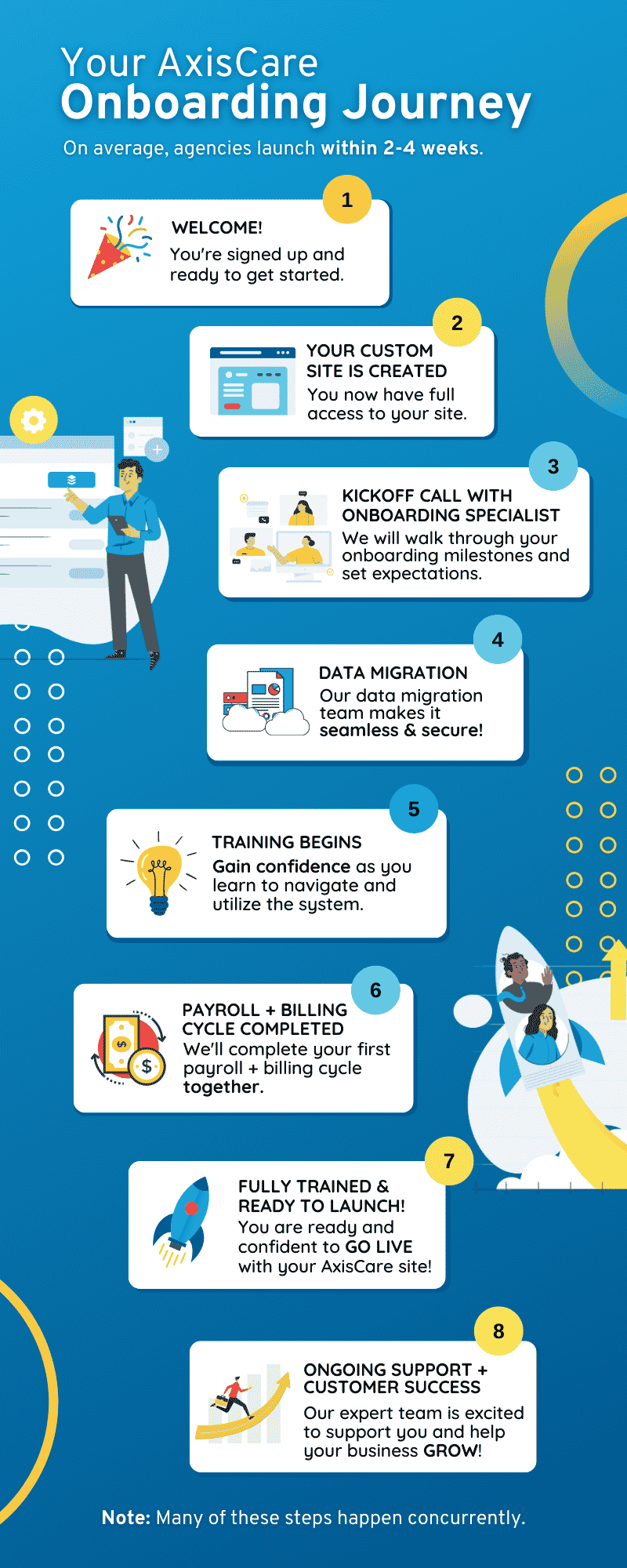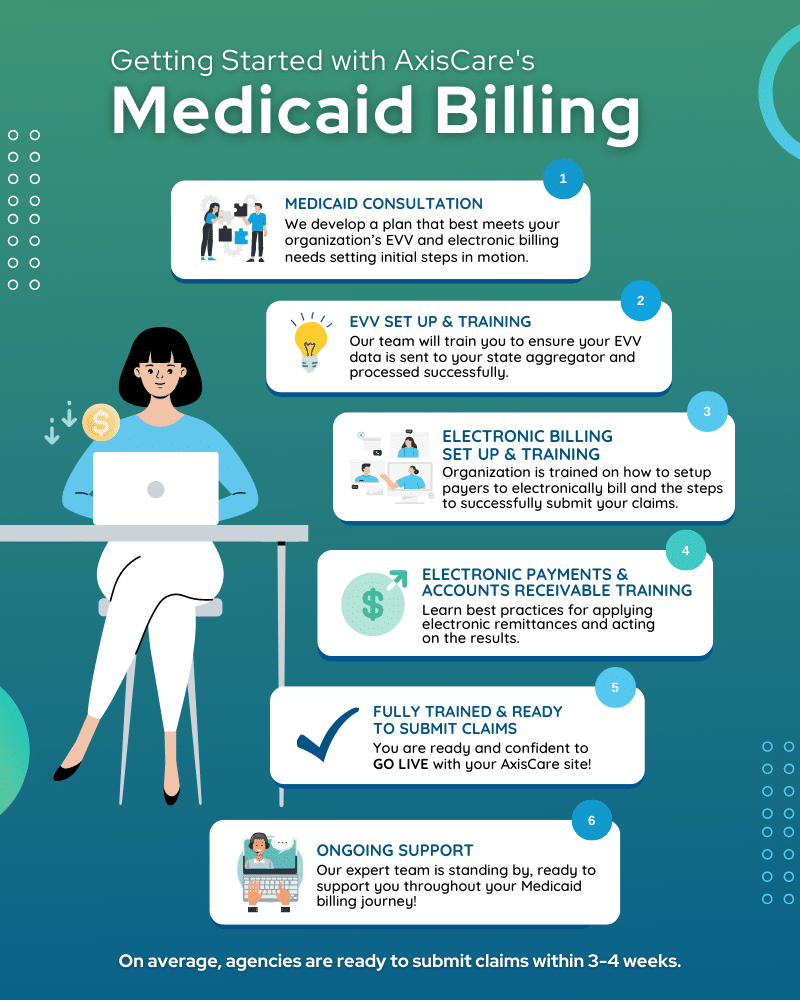Intellectual & Developmental Disability (IDD)
Overview of IDD in Home Care
Intellectual and developmental disabilities (IDD) encompass a wide range of conditions that affect a person’s cognition and/or physical function, depending on their unique circumstances. In a home care context, IDD refers to the specialized assistance provided to individuals who may require assistance with self-care, communication, socializing, and other activities of daily living (ADLs).
To accommodate individuals’ ever-evolving care needs and personal situations, IDD agencies must balance consistent support with a flexible approach: assigning the same caregiver, for example, provides much-needed comfort and stability, but there must always be enough wiggle room to modify support plans when needed. Compliance with regulatory standards must be woven into the entire care process, keeping clients and their data safe while avoiding hefty fines for violating the law.
To do this, agencies use IDD software to integrate technology with person-centered approaches and streamline every echelon of their operations.
Key Aspects of Home Care for IDD
Person-Centered Planning
Support professionals play a critical role in helping individuals with IDD live fulfilling, independent lives by delivering person-centered care (PCC): a philosophy that tailors care recommendations to each individual’s goals and preferences, instead of delivering a one-size-fits-all set of instructions. Put simply, PCC is personalized instead of prescriptive, and human-focused instead of homogenous.
Caring for adults with IDD should be a collaborative journey. By amplifying the client’s voice and inviting them to participate actively in their own care, they will be more likely to adhere to their support plans, as those plans will reflect their reality. Improved adherence leads to more favorable client outcomes, both in the short- and long-term.
Daily Living Assistance
Individuals with IDD typically need help with ADLs such as bathing, dressing, eating, and mobility. Since most conditions under the IDD umbrella affect cognition in some way, a helping hand can go a long way towards supporting their independence and building confidence.
Beyond ADLs, it is also common for IDD care to extend into the realm of executive function, including routine management and medication reminders. Clients may also need help communicating with their peers and addressing various behavioral challenges.
Safe & Accessible Environments
Supporting individuals with IDD often requires thoughtful adaptations that facilitate physical accessibility and sensory comfort. Home modifications can include installing grab bars in bathrooms, adding ramps or stair lifts, widening doorways, and maintaining uncluttered spaces to reduce fall risks and ease mobility.
Equally important are adjustments that promote sensory comfort, such as using soft or adjustable lighting, creating quiet areas to minimize overstimulation, and organizing spaces to reduce distracting clutter. A combination of physical and sensory accommodations can create a safer, more comfortable, and more supportive environment that paves the way for greater autonomy.
IDD Software for Home Care Agencies
Service Documentation & Digital Records
Service documentation is the bedrock of ongoing IDD care. It’s a record of all interventions completed leading up to the present day, as well as any support plan adjustments that have been made over time. These logs are as important for care purposes as they are for IDD compliance and auditing, painting a complete picture of the individual’s care history and the services provided during every appointment.
To keep this information organized, complete, and easy to query, many agencies use home care platforms as a digital storage hub. Various practitioners and support staff can access and update individuals’ information whenever necessary, maintaining a complete and unified service record that’s always up-to-date.
Scheduling & EVV
IDD scheduling software takes the administrative labor out of assigning, verifying, and coordinating visits. These platforms make it quick and easy to assign shifts based on each employee’s skills, availability, and the individual’s needs.
Technology integrations also make it easy to confirm the right practitioner is at the right place at the right time delivering the right services, namely via Electronic Visit Verification (EVV). Instead of hard-copy record-keeping, EVV allows care staff to input appointment details – usually via a connected app – keeping the information standardized in pre-defined text fields.
Billing Software
A single IDD billing error can spiral into delayed repayments, harsh penalties, and disrupted cash flows. Each invoice needs to match billed services to an associated service code and include all of the necessary reporting information. If not, agencies will find themselves in a bind for all the reasons mentioned above.
Home care software is the key to helping agencies manage their billing more efficiently and accurately, automating tasks like time tracking, service verification, and invoicing to reduce errors and administrative burden. These systems have compliance tools built in, and in the best of cases, they also include integrations with third-party payers that make it simple to juggle different protocols.
Common Conditions & Support Needs
IDD agencies aren’t the same as a typical home care agency; they serve individuals with specific intellectual and developmental disabilities, as opposed to organizations that focus on senior care, rehabilitation, or chronic disease management. Some of the most common conditions that can be managed with an IDD agency’s help are autism spectrum disorder, Down syndrome, cerebral palsy, and intellectual disabilities.
For example, support professionals can help individuals with autism stick to structured routines, communicate with others, and accommodate their sensory needs. Those with Down syndrome, on the other hand, often require assistance that encourages independence in daily living and promotes cognitive engagement.
People with cerebral palsy may need physical support for mobility, positioning, and equipment use, whereas individuals with intellectual disabilities may rely on behavioral support, structured activities, and strong caregiver continuity to thrive at home and in their communities.
At the heart of these care interventions, individualized support plans outline goals, preferences, and interventions specific to each diagnosis – and each person. No matter which condition an individual is living with, home care management software can enable PCC by giving agencies the digital tools to document, track, and adapt plans and protocols in real time.
Time saved on administrative tasks like recording observations, monitoring progress, and sharing updates with the entire care team can be reinvested in one-to-one care, delivering more personalized experiences that uplift individuals with IDD.





